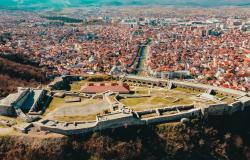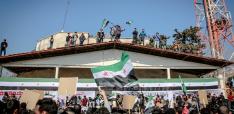Why is the Serbia-Kosovo situation globally serious?

Branko Milanovic on why Vučić may go for war and the difficult position that would put NATO in.
I learned about the newest dispute between Serbia and Kosovo in a New York café when I overheard a very animated conversation between a lady who seemed to blame Serbia for World War I (and perhaps World War III?) and the well-dressed maitre d’ who was so excited that he kept on stammering that Kosovo is an integral part of Serbia, not recognized by most UN members.
But, leaving aside WW1, why is the current situation, and I do not mean in the next week but in the next years as well, extremely serious? It is, after all, not only a very local squabble but a squabble about the territory half the size of Luxembourg, with the population (around 70,000) less than those living in a few buildings along the Hudson river, and even from Serbia’s own perspective entirely marginal as it involves about 1% of all Serbs. Why should the world order depend on this? Because, as often in history, it is small conflicts that are being fought for big stakes. Because small nations like to draw into their conflicts big powers so to achieve their own (small) objectives while big countries see such conflicts as tests of their power.
To understand why the crisis is serious, we have to look at its four actors. They are (in the order of discussion here), Kosovo, Russia, NATO and Serbia.
Albin Kurti, the PM of Kosovo is, without much doubt, the most capable politician in the Balkans. He is helped in this by his anti-colonial ideology (as he believes, with some good reasons, that Kosovo should have never have been part of Serbia; it became part of Serbia in 1913) and very good political skills. Kurti’s short-run objective is to solve the “Serbian problem” in Kosovo by expelling the Serb minority. He sees the Serbs there as people who would never accept Albanian sovereignty (and he is right in that), and he notes that the expulsion of the Serbian minority from Croatia made Croatia much more politically stable (and he is right in that too). In order to achieve his objective he needs to constantly terrorize the Serbian minority, make them feel unsafe and ultimately incentivize them to leave. Since the Russian invasion of Ukraine he has (again rightly) realized that if he manages to provoke a war, he will become a new Zelensky and will have a full support of NATO. (His long-term objective is, I think, the unification of Kosovo and Albania but for now we can leave that out of discussion).
The second actor is Russia. Before the war in Ukraine, Russia had an interest to maintain tensions in Kosovo, but not to encourage a war. Things have changed since: Russia has a clear interest to create as many conflicts in the world as possible, not only to weaken the West, but to “globalize” its war with Ukraine so that a final settlement, when it comes, would be akin to the renegotiation of the global order that was introduced, or imposed, after the end of the Cold War. Moreover, for Russia, the NATO-Serbia war would be as comfortable as for the West is the Ukraine-Russia war. They would send war materiel to Serbia (if they can spare any) but will not have to bear any human cost.
So for now have two actors in favor of the war.
But we have one actor against the war. That actor is, perhaps unexpectedly, NATO. NATO does not need another conflict in Europe, on an entirely peripheral matter of no importance to the United States, while it is focused on the global-order changing de facto war with Russia. NATO and the EU were so angry with Kurti’s destabilization tactics that he has employed since February 2022 that they recently moved to the mildly pro-Serbian positions simply in order to keep things quiet and the conflict from escalating.
The fourth actor is Serbia and it has now an incentive to go to war. The reason is as follows. President Vučić ‘s policies have for more than a decade been driven by the objective of obtaining in Kosovo a territorially-based Association of Serbian Municipalities to which several pre-Kurti Kosovo governments, with EU inducement, have agreed. Vučić would then have been able to claim domestically two victories: to have given to theBranko Milanovic Serbs in Kosovo a quasi autonomous government while not having recognized Kosovo’s independence. Quire a feat. That strategy failed when Kurti refused to accept Western demands to do what the previous Kosovo governments have agreed, and introduced his tactic of daily harassment.
If Vučić cannot get a key part of his program and at the same time has to deal with Kurti-induced harassment of the Serbian minority, thus exposing his own impotence, his entire policy has failed. Would then a war help?
There, we have to take into account that such a war that would start with Serbian forces moving into Kosovo to protect the population in four municipalities and would immediately pit Serbian forces against NATO. But it will not be a cake-walk for NATO. NATO won the 1999 war by bombing civilian targets and threatening to carpet-bomb Belgrade, with Ahtisaari and Chernomyrdin on the same side of the table showing to Milošević that Belgrade would be a table rase. There would be no Chernomyrdin now. The war would also put NATO in a very awkward position of either sending ground forces to Kosovo which is not logistically easy (and is wasteful in light of possible wars with Russia or China) or bombing Serbia as in 1999. The world would be then treated to daily images of civilian targets being destroyed in Ukraine and Serbia by two rival super powers. Other than for propaganda reasons (that the West with its powerful propaganda machinery can more or less control), the war would require significant NATO forces that would either have to expel the Serbian minority from Kosovo or fight against them in an environment which would obviously be hostile.
But it is precisely such a calculation of difficulties of NATO invasion of the Serbian enclaves in Kosovo which might embolden Vučić to go for war. He might recall that Milošević’s popularity reached its peak precisely during NATO bombing of Serbia, that his personal power was then untrammelled by any parliamentary or social restraint, and that he managed to eventually extract a fairly good agreement (that was never observed by NATO). And Vučić might hope that the “winds of freedom” of which he eloquently spoke at the recent UN General Assembly might, miraculously, like in the First World War, turn things in his favour.
This first appeared on Branko's blog.
Photo by Şenad Kahraman


